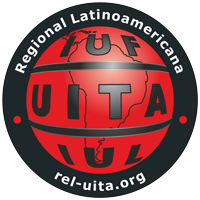 Mural in the Liberdade neighborhood – São Paulo | Photo: Gerardo Iglesias
Mural in the Liberdade neighborhood – São Paulo | Photo: Gerardo IglesiasDespite all of that, Brazilian authorities continue to renew the company’s operating license.
A study published in late June under the title “Sin licencia para la destrucción – Cargill y la violación de derechos en Tapajós [Santarém])” (“No License for Destruction – Cargill and Rights Violations in Tapajós [Santarém]”) ratifies the denunciations that environmentalist and human rights groups have been voicing for almost twenty years.
The document was prepared by Terra de Direitos, an NGO formed in 2002 that has been active in Tapajós since 2010 in situations of conflict over access to land and territories.
The study’s report notes that the expansion of soybean production, introduced by Cargill, accelerated deforestation, polluted the river waters with the toxic agro-chemicals used to treat crops, altered the area’s wildlife, caused huge losses to fisherfolk, pushed farmers to emigrate…
The Union of Rural Workers and Family Farmers of Santarém (STTR-STR) denounced the pressure from the multinational corporation to leave their lands, and how that generated a “food insecurity” that has been growing over the years, according to the report.
The port, which was built without consulting the population, has also had urban and cultural consequences, such as the elimination of one of the main recreational spots, as well as the destruction of archeological sites.
“The fact that the area’s traditional peoples have not been heard means that the reality of the impacts suffered by villages and quilombos [black communities originally formed by fugitive slaves], as well as fisherfolk and family farmers, has been ignored.
In the twenty-two years since the company came to the region, ethnic groups have been left out” of all instances, the NGO’s legal advisor Pedro Martins said.
“Only an effective Free, Prior, and Informed Consultation of the affected indigenous peoples, Quilombola (Afro-Brazilian) communities, and traditional communities can guarantee the continuity of a process of environmental licensing in line with the legislation in force and with human rights principles,” he concluded.
But Cargill has been operating without a valid license since 2020, and Terra de Direitos is calling on environmental agencies at the state and federal government levels to demand that the company repair the damage it has caused and comply with applicable regulations before it issues it a new permit.
This appeal is more a wish that will surely fall on deaf ears given the facilities enjoyed by multinational corporations in the liberal paradise that the Brazilian government has built for them.
